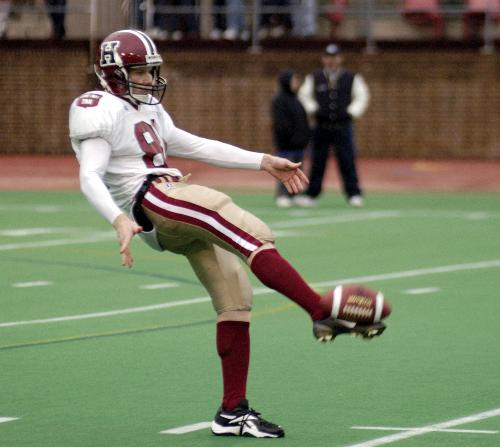
News
Summers Will Not Finish Semester of Teaching as Harvard Investigates Epstein Ties

News
Harvard College Students Report Favoring Divestment from Israel in HUA Survey

News
‘He Should Resign’: Harvard Undergrads Take Hard Line Against Summers Over Epstein Scandal

News
Harvard To Launch New Investigation Into Epstein’s Ties to Summers, Other University Affiliates

News
Harvard Students To Vote on Divestment From Israel in Inaugural HUA Election Survey
O-Line Left Quaking In Its Boots
Rose, sacked four times, never had a chance against Penn’s aggressive defense

PHILADELPHIA—In the Harvard section of Franklin Field, a handmade poster boasted, “We don’t need the Rose Bowl. We’ve got Neil.” But the Crimson needed much more than record-setting senior quarterback Neil Rose on Saturday.
It needed an offensive line.
With the Ivy title on the line, the most prolific passer in school history spent much of the afternoon lying face down on the soggy artificial turf.
Rose sustained three sacks and countless hits and hurries. His career went out with the wrong kind of bangs, and perhaps none was bigger than his first quarter fumble.
Seven minutes into the game, Harvard was in control. Sophomore defensive end Brian Garcia had sacked Penn quarterback Mike Mitchell in the end zone for a safety, bringing the score to 3-2. And on the ensuing offensive possession, the Crimson was marching down the field.
But facing third-and-9 on the Penn 45-yard line, a blitz was inevitable. It came in the form of sophomore linebacker Ric San Doval.
San Doval—who had sacked Rose on the previous play as well—blew past senior right tackle Jamil Soraino and popped the exposed football out of Rose’s grasp. It bounced from the turf straight into the hands of senior defensive end Chris Pennington, who rumbled 51 yards into the end zone for a 10-2 lead.
It was Rose’s second fumble of the game, but Harvard coach Tim Murphy refused to place the blame solely on Rose.
“Obviously, he had a few turnovers,” Murphy said, “but when you say ‘he,’ you really mean ‘we.’ The way the quarterback plays is just an extension of the way the team plays.”
Pennington’s fumble return, the first against Harvard since 1967, was also the beginning of the end for the Crimson.
Before the turnover, Penn had failed to post a first down. Following Pennington’s TD, the Quakers’ scoring stream became as steady as the incessant Philadelphia drizzle.
“[Penn] getting those 10 points that were essentially unearned on the board really hurt us,” Murphy said.
With Rose playing behind a porous offensive line, Harvard couldn’t keep up. Still hobbled by a bad back, Rose was virtually immobile under pressure, and struggled to find time to throw to senior All-American Carl Morris.
Morris finished the day with only three catches for 16 yards, and Rose’s stat line was not much better.
When Murphy pulled the senior in favor of sophomore Ryan Fitzpatrick midway through the third quarter, Rose was 16-of-27 for a paltry 133 yards. Garcia—with his first quarter safety—was the Crimson’s leading scorer.
“We didn’t consider pulling him before the half,” Murphy said.
Perhaps Murphy should have.
With the much more mobile Fitzpatrick at the helm, the Quakers embraced a defensive philosophy that so many opponents have this season—you can’t blitz Fitz.
With the Penn defense softened out of respect for his scrambling ability, the offensive line received a much-needed reprieve. Fitzpatrick led the Crimson on four of its five longest drives of the afternoon, as well as its only score.
But the game was already over.
It was the second time this season that Fitzpatrick has proven more effective than Rose in the face of a strong pass rush.
A month ago, then-No. 14 Northeastern traveled to Harvard Stadium for Rose’s first start since returning from his sciatic nerve injury. But when the senior struggled in the face of a bombardment of blitzes, Murphy sent in Fitzpatrick.
The sophomore quickly turned a 10-0 deficit into a 14-10 lead, but couldn’t carry the Crimson to victory .
On Saturday, neither quarterback could.
—Staff writer Lande A. Spottswood can be reached at spottsw@fas.harvard.edu.
Want to keep up with breaking news? Subscribe to our email newsletter.
